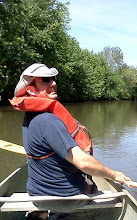O LORD, how manifold are your works! In wisdom you have made them all; the earth is full of your creatures. Psalm 104:24
 |
| Photo: Vivian Stockman, Southwings.org |
On our recent trip to serve with Sharing with Appalachian People (SWAP) in Hindman, KY, the high school students and sponsors from church and I had the opportunity to visit a reclaimed mountaintop strip mine. Denuding mountaintops of vegetation and stripping off mineral resources poses significant danger to the health of both humans and wildlife. Draglines, large, surface-mining machines, can move 100+ cubic yards of earth in a single scoop! But the people of the region can’t imagine life without coal. Coal is what brought many of the families to the mountains generations ago, and mining provides income to sustain their families today. A modest step—perhaps a lesser evil—that seeks better equilibrium between industry and ecology is mountaintop reclamation in which denuded areas are planted with conservation grasses to stabilize and re-cover the surface mine with vegetation.
The irony is that while the loss of deep forests has led to the decline of several species of neotropical migratory songbirds dependent on that habitat, the return of open grassland and additional forest-edge has meant an increase in other bird species which had experienced decline previously. Additionally, at this particular site, we found ourselves a stone’s throw from four individuals of a herd of resettled Elk. Once prevalent east of the Mississippi, Elk were extirpated from 90% of their pre-European-settlement range in the U.S. by the early 1900s.
I say “a lesser evil” when speaking of mountaintop reclamation because the plant species chosen for revegetation are non-native, European hay grasses; shallow-rooted and poor food for native animals. Were reclamation efforts to shift to using deep-rooted native grasses capable of breaking up compacted mine soil and, further, planting the next generation of forest saplings, I could bring myself, perhaps, to call the work “a greater good.”
The irony is that while the loss of deep forests has led to the decline of several species of neotropical migratory songbirds dependent on that habitat, the return of open grassland and additional forest-edge has meant an increase in other bird species which had experienced decline previously. Additionally, at this particular site, we found ourselves a stone’s throw from four individuals of a herd of resettled Elk. Once prevalent east of the Mississippi, Elk were extirpated from 90% of their pre-European-settlement range in the U.S. by the early 1900s.
I say “a lesser evil” when speaking of mountaintop reclamation because the plant species chosen for revegetation are non-native, European hay grasses; shallow-rooted and poor food for native animals. Were reclamation efforts to shift to using deep-rooted native grasses capable of breaking up compacted mine soil and, further, planting the next generation of forest saplings, I could bring myself, perhaps, to call the work “a greater good.”
See: Mountaintop Removal/Valley Fill Coal Mining Impacts on Birds [American Bird Conservancy]

No comments:
Post a Comment